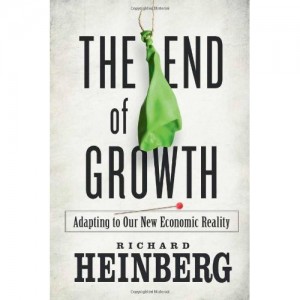**January 2011 Book Pick – “The Legacy of Martin Luther King Jr” by Lewis Baldwin
“The End of Growth”
Richard Heinberg
The End of Growth is an honest look at our whole economy, which means it is not an encouraging book. Compared to Heinberg’s other work, this one spends less time on resource and environmental limits while focusing more on the financial system. But the importance of the book is that he combines the financial economy with the physical economy. He points out that most optimistic views of the future ignore one side of the system or the other. Those who hope to save the financial system assume a continued massive supply of natural resources and environmental services. Those who hope to avoid environmental catastrophe assume a massive influx of financial resources. Heinberg shows that in order to be optimistic about one side of the system, we must ignore the rest of the system. But when we take a holistic view, it is inescapable that we are reaching real limits.
These limits (and the associated denial of them) is increasingly obvious in current events and global economic news. All the coverage of the failure of the deficit supercommittee focused on how politics stood in the way of a solution. While that is certainly true, the DC Circus is a dangerous distraction from the fact that economic reality also stands in the way of a solution. Heinberg shows that the massive increase in debt, both public and private, has just been a band-aid to hide the genuine inability of the economy to continue on its old path.
While he follows the familiar enviro-book pattern of problem-problem-solution, Heinberg’s solutions section at the end is not as sunny as most. It seems less like a plan for putting out the fire than a short list of things to grab on our way out the door. While showing how “our problems are resolvable in principle,” Heinberg also includes the inconvenient “if” and “but” clauses. “If we are willing to change our way of life and the fundamental structures of society….But our society as a whole is not inclined to do what is required to solve them, even if the consequences of failing to do so are utterly apocalytic.”
Heinberg offers some efforts to buy time for an intelligent transition, while stressing that these are not solutions but just delay tactics. I disagree with him that some of these tactics can legitimately be described as a patch on the current system rather than the end of it. His suggestion for a 90% debt jubilee is not a “haircut” as he describes it, but a decapitation. In reality, an immediate 90% reduction in all financial accounts would do more than “re-set” the global economy. It would cause a full meltdown and wipe the global economy off the map. More realistically, it couldn’t even happen until after the full meltdown occurs and Wall Street has literally been burned to the ground.
Heinberg’s real solution is that we have to let go of the current system and move on to a post-growth world. That world will be decentralized and far more dependent on human relationships. This is Heinberg’s ultimate point: “The maintenance of social cohesion must be our single highest priority in a future of mounting economic and environmental challenges.” He brings his sophisticated book about economic complexities around to a wonderfully simple recommendation. “It’s hard to emphasize this point sufficiently: Get to know your neighbors.” He discusses Transition Towns and Common Security Clubs and ultimately makes it clear that any real solutions will be up to us in our own communities

Leave a Reply